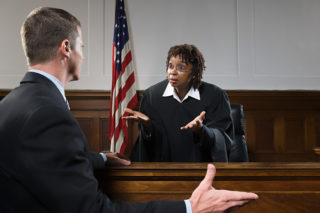A common area ob abuse occurs when attorneys instruct a witness not to answer a deposition question.
Continue Reading What to do When the Deponent Refuses to Answer
Abuse and Professionalism
“You Harm Your Client’s Interest When You Craft or Transmit Evasive Discovery Responses”

That is what the Eighth Division of the Second District Court of Appeal said in their opinion in Beth Field v. U.S. Bank National Association B309111 filed on June 9, 2022. The Court of Appeal went further and said “You likewise harm your own prospects if ever you hope for a fee award. (See Karton v. Ari Design & Construction Inc. (2021) 61 Cal.App.5th 734, 747 [attorney unprofessionalism justifies reducing fee awards].)”
WHEN YOU GET BOMBARDED WITH DISCOVERY…

Have you ever been in any of these situations?
Ten days after your client was served with the summons and complaint, the client was personally served with Form Interrogatories, 35 specially prepared interrogatories, 35 requests for admissions and 50 document requests.
Days after an unsuccessful mediation, you are served with 75 requests for admission, 60 special interrogatories, Form Interrogatory #17.1 and 100 requests for documents. A Declaration of Necessity was served with the discovery.
Eleven days before the close of discovery, opposing counsel hand serves you with a Person Most Knowledgeable/Custodian of Records Deposition Notice with 27 separate categories for testimony and 67 requests for documents.
In each of these situations the discovery propounded was proper according to the Code of Civil Procedure.
Continue Reading WHEN YOU GET BOMBARDED WITH DISCOVERY…
You Must be Diligent in Discovery to get a MSJ/MSA Continued

On July 29, 2021, in the case of Braganza v. Albertson’s LLC, (2021) 67 Cal. App. 5th 144, the Fourth District Appellate District affirmed the trial court’s denial of Plaintiff’s motion to continue the hearing for a Motion for Summary Judgment and thereafter granting the defense’s motion. The key: Plaintiff’s counsel sought the continuance on the ground that she needed additional discovery to oppose the motion but did not demonstrate diligence in timely conducting discovery before seeking the continuance.
Continue Reading You Must be Diligent in Discovery to get a MSJ/MSA Continued
Opposing Counsel is Blowing Smoke

A plaintiff counsel writes in asking for advice:
“Today is July 7th. Trial is July 31. Discovery cut-off was July 1 and expert discovery closes on July 16th. Well, my client sought additional treatment on June 25thwith a neck, back and spine specialist. The results of the visit were provided to me on June 26th and I immediately mailed the results to opposing counsel that day. Now opposing counsel is stating the discovery is after the cutoff and inadmissible and the doctor can’t testify because expert disclosure has passed. I’m really worried about whether I will be able to use the evidence and if so, how I will be able to use the evidence?”
Opposing counsel is blowing smoke at this young lawyer.Continue Reading Opposing Counsel is Blowing Smoke
DO YOU KNOW WHAT YOUR OBLIGATIONS ARE IN RESPONDING TO WRITTEN DISCOVERY?

I received a comment about one of my blogs saying:
Many young(er) attorneys abuse discovery as a matter of course – as if they have been taught how to be obstructionists at law school. I also think newer attorneys do the scorched earth route to create more billing. One dope sent me objections that were over 100 pages.
I have written many blogs regarding how to handle discovery abuse by opposing counsel. These include filing motions to compel further responses, filing motions for protective orders and how to recover sanctions.Continue Reading DO YOU KNOW WHAT YOUR OBLIGATIONS ARE IN RESPONDING TO WRITTEN DISCOVERY?
DISCOVERY GAMES AND MISCONCEPTIONS – Are These Objections Legitimate?
Several times per month I receive questions from attorneys regarding a discovery dilemma. Mostly the questions offer a novel twist on basic discovery. However, this latest query was quirkier than most and raised some interesting issues and misconceptions, so I thought I would share it with you. It went like this:
I served written discovery on a cross-defendant in a case, we are one of the defendants. Cross-defendant (represented by, the plaintiff’s counsel) has appeared in this case by way of demurrer. Cross-Defendant has refused to answer for the following reasons, (1) my clients are not parties to the cross-complaint so therefore we cannot propound discovery; (2) the court sustained the demurrer with leave to amend and the amended cross-complaint will be filed shortly by the cross-complainant; and (3) the cross-defendant lives in Europe and I need to go through the Hague Convention. I don’t think any of these are legitimate reasons for not responding to discovery.
Continue Reading DISCOVERY GAMES AND MISCONCEPTIONS – Are These Objections Legitimate?
Should you withdraw your motion if the other side has complied?

I have always been a strong advocate that you should be awarded sanctions if you had to bring a motion to get the relief you were entitled to even if the other side complied prior to the hearing on the motion. However in the case of Evilsizor v. Sweeney (2014) 230 CA4th 1304, the First District Court of Appeal had an interesting take on the issue.
Continue Reading Should you withdraw your motion if the other side has complied?
When Discovery Abuse is a Trial Strategy
I was asked how do you handle discovery abuse when it is part of a deep pocket defendant’s litigation strategy. His story went like this:
Plaintiff’s counsel had been to court several times on motions to compel documents and motions to compel further documents from an international Corporation. The court’s most recent order was that the documents were to be served two weeks before the corporation’s person most knowledgeable depositions were to take place in London. Instead defendant produced 30,000 documents on a CD less than 24 hours before the London depositions were to begin. Plaintiff counsel went forward with the depositions as trial was in a month and his client could not afford for the lawyer to go to London another time. Plaintiff counsel expressed his frustrations that even though the court gave him $6000 in sanctions he was severely handicapped in his preparation for the depositions and it impacted on what evidence he could obtain before trial.
Even though this is an extreme example, it is not unusual. The real question is what could he have done and what should you do if you find yourself in this situation.
Continue Reading When Discovery Abuse is a Trial Strategy
Am I Naïve to Think Something Should Be Done?
What do you do when you are being out muscled by a party who has deep pockets and a lawyer who’s intent is to abuse the discovery process and run up his bills.
ANSWER–GET THE COURT INVOLVED!!
Continue Reading Am I Naïve to Think Something Should Be Done?

